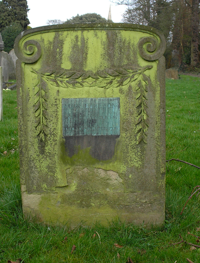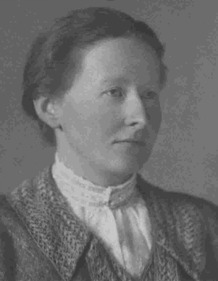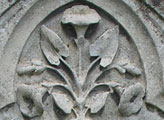Mary Bateson 1865-1906

A modest headstone with a copper plate inscribed:
MARY BATESON
BORN 12 SEPTEMBER 1865
DIED 30 NOVEMBER 1906
is the resting place of an eminent scholar and
committed supporter of the movement for
women’s suffrage.
Born into the academic world of Cambridge where her father was Master of St John’s College, Mary attended the Misses Thornton’s School for Young Ladies, then went to study in Germany where she quickly gained a good knowledge of the language. In 1871 she returned to the newly opened Perse School for Girls, completing her studies and teaching German.
Mary Bateson’s parents were supporters of the movement for the higher education of women and were involved as founders of Newnham College in 1871. Were they perhaps anticipating the education of their family? In 1884 both Mary and her sister Anna entered the College. Mary graduated second in the history tripos but, as a woman, received only a ‘certificate’ rather than a formal first class degree. Her dissertation on ‘Monastic Civilisation in the Fens’ reflected her interest in the Medieval period and the development of both monastic and civil law, which she studied and researched for the rest of her life. Having private means she was fortunate to be able to remain at Newnham, as there was no funding for graduates to stay on and undertake research. She campaigned successfully for the establishment of research fellowships and was delighted to be one of the first recipients and receive recognition as a ‘Fellow’ of the College, although she returned the monetary grant to college funds. She wrote and edited a significant number of books, papers and articles for both an academic and popular audience.
Whilst an undergraduate Mary was a keen member of the debating society and may well have discussed the issue of women’s suffrage during debates. Her mother was a founding member of the moderate Cambridge Women’s Suffrage Movement. Mary became actively involved, serving on the committee and as secretary and organiser. Her support for the movement brought some disapproval from colleagues but her commitment was steadfast during a period when progress was slow. In 1906, as a member of a deputation to the Prime Minister Campbell-Bannerman, she made a speech highlighting the absurdity of women not being able to vote whilst achieving huge academic and professional success; she also presented a petition signed by 1530 women graduates.
In her early thirties Mary’s determination to be an independent women is reflected in her taking what was, at that time, the socially unusual step for a single women of setting up a home of her own at 74 Huntingdon Road.
 Her sudden death in at the age of forty-one was greatly mourned. Obituaries reflected the high regard in which she was held, recalling her as an ‘historian of the very first rank’ and ‘a gracious compassionate woman with a sense of humour and a keen intellect’. She had the unusual distinction (for a woman) of an entry in the National Dictionary of Biography, to which she had contributed over one hundred entries on medieval saints, monks and noblemen. Mary bequeathed her Library and estate to the College, where, in 1909, the Mary Bateson Fellowship was established as a fitting memorial.
Her sudden death in at the age of forty-one was greatly mourned. Obituaries reflected the high regard in which she was held, recalling her as an ‘historian of the very first rank’ and ‘a gracious compassionate woman with a sense of humour and a keen intellect’. She had the unusual distinction (for a woman) of an entry in the National Dictionary of Biography, to which she had contributed over one hundred entries on medieval saints, monks and noblemen. Mary bequeathed her Library and estate to the College, where, in 1909, the Mary Bateson Fellowship was established as a fitting memorial.
Sources: Portrait photo © Newnham College
National Dictionary of Biography. The Women’s Suffrage Movement: A reference guide, E Crawford. The Women’s Suffrage Movement in Britain, S A Van Wingerden. The Times, Obituary 1-12-1906. With thanks to Anne Thomson, Newnham College Archivist for access to Newnham College Letters 1906.
